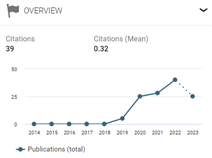Dampak serat terhadap produksi asam lemak rantai pendek pada penderita penyakit crohn
DOI: 10.30867/gikes.v5i3B.1907Abstract
Background: Crohn's disease patients experience dysbiosis or an imbalance in the composition of microbes in the gut, in contrast to individuals who do not have Crohn's disease. The intestinal immune system has a very important role in Crohn's disease. Pathogenesis can be understood from the immune system by knowing the gut microbiota. Short-chain fatty acids are anti-inflammatory substances produced from the breakdown of soluble fiber in the intestines by certain microbiota species.
Objective: The purpose of this literature is to determine the effect of fiber on short-chain fatty acids and to form the gut microbiota of humans with Crohn's disease.
Methods: Systematic searches were conducted on Google Scholar, PubMed, Science Direct and Scopus. Randomised controlled trials evaluating the role of fibre were sought between 2020-2024 to determine the application of fibre therapies and interventions to patients with Crohm's disease (age is not restricted).
Results: This literature study revealed that fiber may affect the composition of gut microbiota diversity in patients with Crohn's disease. Fiber increases the gut microbiota and produces short-chain fatty acids, especially increasing Firmicutes, Bifidobacteria, and Roseburia bacteria in Crohn's disease patients. In intestinal cells, short-chain fatty acids undergo cell proliferation, cell differentiation and gene expression. Short-chain fatty acids function as ligands that pair with G-proteins (GPCRs), including GPR41, GPR43 so that they activate the anti-inflammatory signal cascade.
Conclusion: A wide variety of fermented fibers are able to produce the diversity of the intestinal microbiota of Crohn's disease patients and produce short-chain fatty acid molecules that can activate anti-inflammatory signals. Therefore, fiber as a prebiotic is very beneficial in maintaining the intestinal immune system in Crohn's disease patients.
Keywords
Full Text:
PDFReferences
Agus, A., Denizot, J., Thévenot, J., Martinez-Medina, M., Massier, S., Sauvanet, P., Bernalier-Donadille, A., Denis, S., Hofman, P., Bonnet, R., Billard, E., & Barnich, N. (2016). Western diet induces a shift in microbiota composition enhancing susceptibility to Adherent-Invasive E. coli infection and intestinal inflammation. Scientific Reports, 6. https://doi.org/10.1038/SREP19032
Armstrong, H. K., Bording-Jorgensen, M., Santer, D. M., Zhang, Z., Valcheva, R., Rieger, A. M., Sung-Ho Kim, J., Dijk, S. I., Mahmood, R., Ogungbola, O., Jovel, J., Moreau, F., Gorman, H., Dickner, R., Jerasi, J., Mander, I. K., Lafleur, D., Cheng, C., Petrova, A., … Wine, E. (2023). Unfermented β-fructan Fibers Fuel Inflammation in Select Inflammatory Bowel Disease Patients. Gastroenterology, 164(2), 228–240. https://doi.org/10.1053/j.gastro.2022.09.034
Belcheva, A., Irrazabal, T., Robertson, S. J., Streutker, C., Maughan, H., Rubino, S., Moriyama, E. H., Copeland, J. K., Kumar, S., Green, B., Geddes, K., Pezo, R. C., Navarre, W. W., Milosevic, M., Wilson, B. C., Girardin, S. E., Wolever, T. M. S., Edelmann, W., Guttman, D. S., … Martin, A. (2014). Gut microbial metabolism drives transformation of MSH2-deficient colon epithelial cells. Cell, 158(2), 288–299. https://doi.org/10.1016/J.CELL.2014.04.051
Brown, K., DeCoffe, D., Molcan, E., & Gibson, D. L. (2012). Diet-Induced Dysbiosis of the Intestinal Microbiota and the Effects on Immunity and Disease. Nutrients, 4(8), 1095. https://doi.org/10.3390/NU4081095
Buffet-Bataillon, S., Bouguen, G., Fleury, F., Cattoir, V., & Le Cunff, Y. (2022). Gut microbiota analysis for prediction of clinical relapse in Crohn’s disease. Scientific Reports 2022 12:1, 12(1), 1–8. https://doi.org/10.1038/s41598-022-23757-x
De Souza, H. S. P., & Fiocchi, C. (2016). Immunopathogenesis of IBD: current state of the art. Nature Reviews. Gastroenterology & Hepatology, 13(1), 13–27. https://doi.org/10.1038/NRGASTRO.2015.186
Di Rosa, C., Altomare, A., Imperia, E., Spiezia, C., Khazrai, Y. M., & Guarino, M. P. L. (2022). The Role of Dietary Fibers in the Management of IBD Symptoms. Nutrients, 14(22). https://doi.org/10.3390/NU14224775
Eckburg, P. B., Bik, E. M., Bernstein, C. N., Purdom, E., Dethlefsen, L., Sargent, M., Gill, S. R., Nelson, K. E., & Relman, D. A. (2005). Diversity of the Human Intestinal Microbial Flora. Science (New York, N.Y.), 308(5728), 1635. https://doi.org/10.1126/SCIENCE.1110591
Feuerstein, J. D., & Cheifetz, A. S. (2017). Crohn Disease: Epidemiology, Diagnosis, and Management. Mayo Clinic Proceedings, 92(7), 1088–1103. https://doi.org/10.1016/J.MAYOCP.2017.04.010
Geirnaert, A., Calatayud, M., Grootaert, C., Laukens, D., Devriese, S., Smagghe, G., De Vos, M., Boon, N., & Van De Wiele, T. (2017). Butyrate-producing bacteria supplemented in vitro to Crohn’s disease patient microbiota increased butyrate production and enhanced intestinal epithelial barrier integrity. Scientific Reports 2017 7:1, 7(1), 1–14. https://doi.org/10.1038/s41598-017-11734-8
Gerasimidis, K., Nichols, B., McGowan, M., Svolos, V., Papadopoulou, R., Kokkorou, M., Rebull, M., Gonzalez, T. B., Hansen, R., Russell, R. K., & Gaya, D. R. (2022). The Effects of Commonly Consumed Dietary Fibres on the Gut Microbiome and Its Fibre Fermentative Capacity in Adults with Inflammatory Bowel Disease in Remission. Nutrients, 14(5). https://doi.org/10.3390/nu14051053
He, C., Wang, H., Liao, W. Di, Peng, C., Shu, X., Zhu, X., & Zhu, Z. H. (2019). Characteristics of mucosa-associated gut microbiota during treatment in Crohn’s disease. World Journal of Gastroenterology, 25(18), 2204. https://doi.org/10.3748/WJG.V25.I18.2204
Heaton, K. W., Thornton, J. R., & Emmett, P. M. (1979). Treatment of Crohn’s disease with an unrefined-carbohydrate, fibre-rich diet. British Medical Journal, 2(6193), 764–766. https://doi.org/10.1136/BMJ.2.6193.764
Hedin, C. R., McCarthy, N. E., Louis, P., Farquharson, F. M., McCartney, S., Stagg, A. J., Lindsay, J. O., & Whelan, K. (2021). Prebiotic fructans have greater impact on luminal microbiology and CD3+ T cells in healthy siblings than patients with Crohn’s disease: A pilot study investigating the potential for primary prevention of inflammatory bowel disease. Clinical Nutrition, 40(8), 5009–5019. https://doi.org/10.1016/j.clnu.2021.05.033
Lacerda, J. F., Lagos, A. C., Carolino, E., Silva-Herdade, A. S., Silva, M., & Guerreiro, C. S. (2021). Functional food components, intestinal permeability and inflammatory markers in patients with inflammatory bowel disease. Nutrients, 13(2), 1–15. https://doi.org/10.3390/nu13020642
Limketkai, B. N., Iheozor-Ejiofor, Z., Gjuladin-Hellon, T., Parian, A., Matarese, L. E., Bracewell, K., MacDonald, J. K., Gordon, M., & Mullin, G. E. (2019). Dietary interventions for induction and maintenance of remission in inflammatory bowel disease. The Cochrane Database of Systematic Reviews, 2(2). https://doi.org/10.1002/14651858.CD012839.PUB2
Lipinwati, L. (2022). Inflamasi Bowel Disease. Electronic Journal Scientific of Environmental Health And Disease, 2(2), 141–147. https://doi.org/10.22437/esehad.v2i2.16919
Lo, C. H., Lochhead, P., Khalili, H., Song, M., Tabung, F. K., Burke, K. E., Richter, J. M., Giovannucci, E. L., Chan, A. T., & Ananthakrishnan, A. N. (2020). Dietary Inflammatory Potential and Risk of Crohn’s Disease and Ulcerative Colitis. Gastroenterology, 159(3), 873-883.e1. https://doi.org/10.1053/J.GASTRO.2020.05.011
Makki, K., Deehan, E. C., Walter, J., & Bäckhed, F. (2018). The Impact of Dietary Fiber on Gut Microbiota in Host Health and Disease. Cell Host & Microbe, 23(6), 705–715. https://doi.org/10.1016/J.CHOM.2018.05.012
Mendall, M. A., Chan, D., Patel, R., & Kumar, D. (2016). Faecal calprotectin: factors affecting levels and its potential role as a surrogate marker for risk of development of Crohn’s Disease. BMC Gastroenterology, 16(1). https://doi.org/10.1186/S12876-016-0535-Z
Morgan, X. C., Tickle, T. L., Sokol, H., Gevers, D., Devaney, K. L., Ward, D. V., Reyes, J. A., Shah, S. A., LeLeiko, N., Snapper, S. B., Bousvaros, A., Korzenik, J., Sands, B. E., Xavier, R. J., & Huttenhower, C. (2012). Dysfunction of the intestinal microbiome in inflammatory bowel disease and treatment. Genome Biology, 13(9). https://doi.org/10.1186/GB-2012-13-9-R79
Ng, S. C., Shi, H. Y., Hamidi, N., Underwood, F. E., Tang, W., Benchimol, E. I., Panaccione, R., Ghosh, S., Wu, J. C. Y., Chan, F. K. L., Sung, J. J. Y., & Kaplan, G. G. (2017). Worldwide incidence and prevalence of inflammatory bowel disease in the 21st century: a systematic review of population-based studies. Lancet (London, England), 390(10114), 2769–2778. https://doi.org/10.1016/S0140-6736(17)32448-0
Oliver, L., Ramió-Pujol, S., Amoedo, J., Malagón, M., Serrano, M., Bahí, A., Lluansí, A., Torrealba, L., Busquets, D., Pardo, L., Serra-Pagès, M., Aldeguer, X., & Garcia-Gil, J. (2021). A Novel Grape-Derived Prebiotic Selectively Enhances Abundance and Metabolic Activity of Butyrate-Producing Bacteria in Faecal Samples. Frontiers in Microbiology, 12(March), 1–10. https://doi.org/10.3389/fmicb.2021.639948
Orrell, M., van ’t Hullenaar, C., & Gosling, J. (2021). Upper gastrointestinal tract involvement in Crohn’s disease: A case report. International Journal of Surgery Case Reports, 81, 105810. https://doi.org/10.1016/J.IJSCR.2021.105810
Owczarek, D., Rodacki, T., Domagała-Rodacka, R., Cibor, D., & Mach, T. (2016). Diet and nutritional factors in inflammatory bowel diseases. World Journal of Gastroenterology, 22(3), 895–905. https://doi.org/10.3748/WJG.V22.I3.895
Park, S. H. (2022). Update on the epidemiology of inflammatory bowel disease in Asia: where are we now? Intestinal Research, 20(2), 159–164. https://doi.org/10.5217/IR.2021.00115
Serrano Fernandez, V., Seldas Palomino, M., Laredo-Aguilera, J. A., Pozuelo-Carrascosa, D. P., & Carmona-Torres, J. M. (2023). High-Fiber Diet and Crohn’s Disease: Systematic Review and Meta-Analysis. Nutrients, 15(14). https://doi.org/10.3390/NU15143114/S1
Siddique, I., Mustafa, A., Khan, I., Ziyab, A., Altarrah, M., Sulaiman, R., Kadungothayil, N., & Shaheed, F. (2021). Detection of mutations in NOD2/CARD15 gene in Arab patients with Crohn’s disease. Saudi Journal of Gastroenterology : Official Journal of the Saudi Gastroenterology Association, 27(4), 240–248. https://doi.org/10.4103/SJG.SJG_582_20
Sinulingga, B. O. (2020). Pengaruh konsumsi serat dalam menurunkan kadar kolesterol. Jurnal Penelitian Sains, 22(1), 9–15. http://ejurnal.mipa.unsri.ac.id/index.php/jps/article/download/556/554
Stange, E. F., & Schroeder, B. O. (2019). Microbiota and mucosal defense in IBD : an update. Expert Review of Gastroenterology & Hepatology, 13(10), 963–976. https://doi.org/10.1080/17474124.2019.1671822
Stephen, A. M., Champ, M. M. J., Cloran, S. J., Fleith, M., Van Lieshout, L., Mejborn, H., & Burley, V. J. (2017). Dietary fibre in Europe: current state of knowledge on definitions, sources, recommendations, intakes and relationships to health. Nutrition Research Reviews, 30(2), 149–190. https://doi.org/10.1017/S095442241700004X
Vanuytsel, T., Tack, J., & Farre, R. (2021). The Role of Intestinal Permeability in Gastrointestinal Disorders and Current Methods of Evaluation. Frontiers in Nutrition, 8. https://doi.org/10.3389/FNUT.2021.717925
Veauthier, B., & Hornecker, J. R. (2018). Crohn’s Disease: Diagnosis and Management. American Family Physician, 98(11), 661–669. https://www.aafp.org/pubs/afp/issues/2018/1201/p661.html
Verburgt, C. M., Dunn, K. A., Ghiboub, M., Lewis, J. D., Wine, E., Boneh, R. S., Gerasimidis, K., Shamir, R., Penny, S., Pinto, D. M., Cohen, A., Bjorndahl, P., Svolos, V., Bielawski, J. P., Benninga, M. A., de Jonge, W. J., & Van Limbergen, J. E. (2023). Successful Dietary Therapy in Paediatric Crohn’s Disease is Associated with Shifts in Bacterial Dysbiosis and Inflammatory Metabotype Towards Healthy Controls. Journal of Crohn’s and Colitis, 17(1), 61–72. https://doi.org/10.1093/ECCO-JCC/JJAC105
Zheng, J., Sun, Q., Zhang, J., & Ng, S. C. (2022). The role of gut microbiome in inflammatory bowel disease diagnosis and prognosis. United European Gastroenterology Journal, 10(10), 1091–1102. https://doi.org/10.1002/UEG2.12338
Refbacks
- There are currently no refbacks.













